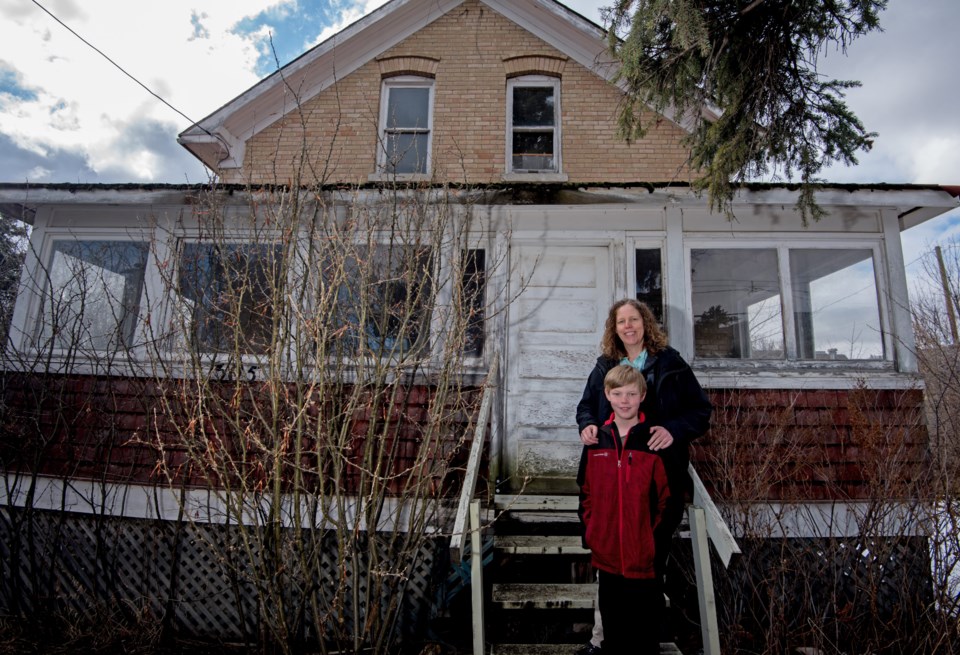After obtaining a heritage home more than a year ago with the intention of turning the 1911 house into a mental health clinic, the owners are appealing the development permit that states they will be responsible for burying power lines adjacent to th
After obtaining a heritage home more than a year ago with the intention of turning the 1911 house into a mental health clinic, the owners are appealing the development permit that states they will be responsible for burying power lines adjacent to the property.
“My heart sunk into my gut when I saw my restoration budget go out the window, ” Michelle Copithorne, business manager of Dara Health Ltd. who owns the house, said during the Cochrane Planning Comission (CPC) meeting on April 19.
At the recent meeting, Copithorne’s plan to restore the 100-year-old heritage house was received favourably but her contestation to the planning department’s request to enter into a Differed Service Agreement (DSA) was struck down.
Her development application was approved by the CPC to move the clinic forward with the addition of the following condition:
“Prior to the issuance of a development permit, the applicant/owner shall enter into a DSA with the town based on a proportional share of the total costs associated with the applicant/owner’s street frontage on Ross Avenue and the burial of power lines in accordance with Section 11.28.0 of the Land Use Bylaw. ”
Town planners explained the DSA is a common tool used in municipalities to help pay for the cost of infrastructure improvements that require off-site levy support for future development.
“The way our bylaw speaks, developers will always be charged to improve off-site, that can also mean improvement to infrastructure to adjacent property, ” Kemi Apanisile, town planner explained.
This decision is in conjunction with a land-use bylaw that passed in 2004, stating all shallow utility services (i.e. electrical, gas, telecommunication and cable TV) shall be underground for land use.
“The DSA is simply a clause that is registered on the property that states the owner will pay a proportionate share of the cost to bury the power lines in the benefitting area, ” Apanisile said.
“The properties within the benefiting area along Ross Ave maybe subject to a DSA upon the time when a development application is triggered on the respective property. ”
While Copithorne said the company has no problem paying off-site levies to improve infrastructure, the business manager said paying to bury the power lines feels “excessive. ”
“It feels like a prejudicial tax because basically this wouldn’t be a requirement in a new area, ” she explained.
“But despite this one bylaw interpretation - the town has been very good to work with and very accommodating to our project. ”
When Copithorne pitched the proposed counselling centre to council last July, all councillors were in favour of the idea and the Cochrane Historical Archival Preservation Society (CHAPS) also voiced their support.
At the CPC meeting, Copithorne asked she not be required to enter into a DSA as this would mean that even though the burying of the power lines along Williams Street would be deferred (for possibly many years, depending on a triggering event), she would be required to set the funds aside to cover the costs of this and therefore, this would take away from her restoration budget of the house.
The planning commission made the decision in-camera with 6-1 voting in favour - councillor Morgan Nagel opposed.
“I’m worried the DSA might be a large disincentive for future development, ” Nagel said.
“We want unique projects and small businesses and as it currently stands that is the town’s policy, and it is my understanding the power lines are privately owned - so I don’t know why the government is forcing tax payers to bear the cost. ”
Copithorne said they will be appealing the DSA and pending development permits she is hopeful to open the doors by 2018.
“I just hope that we can come to an agreeable solution for everyone, ” Nagel said.
